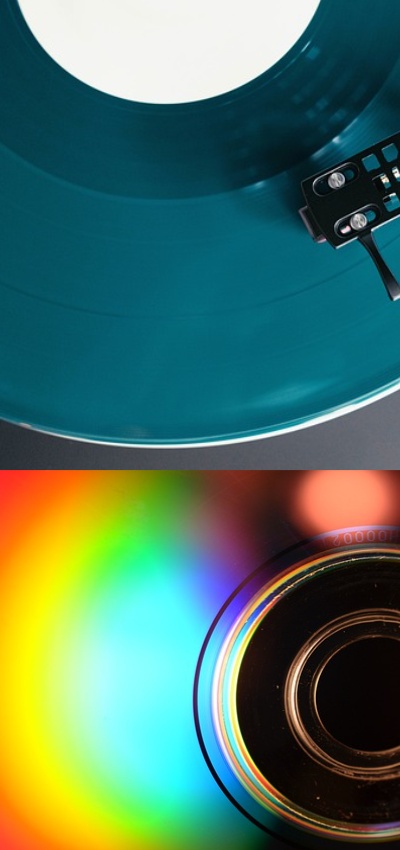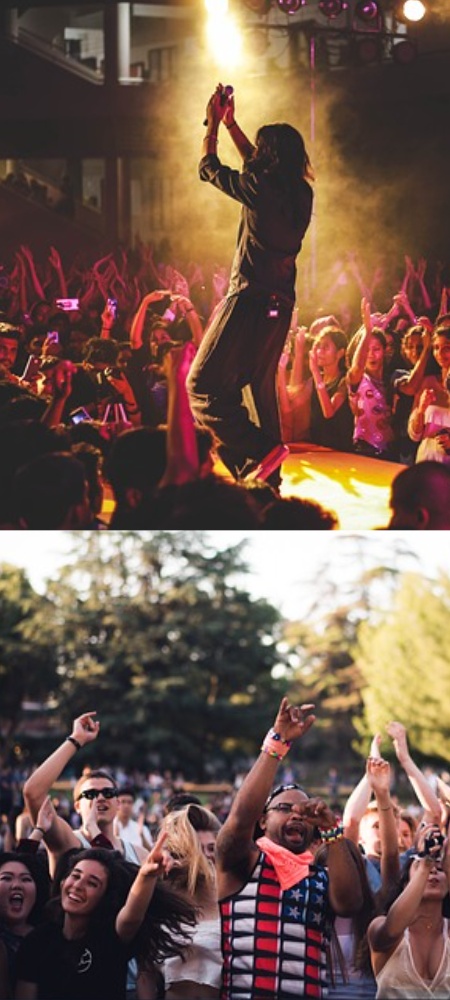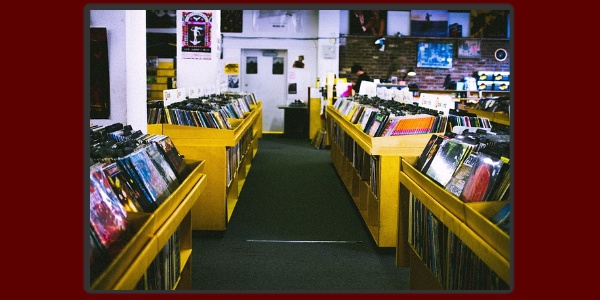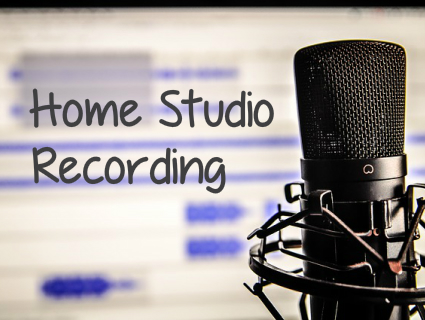The Independent Musician
In this article, we'll define what an independent musician is, and take a look at what it takes to be an independent musician: from the basics of career and labels, to copyrights, to marketing your music and building a fanbase.
What Is An Independent Musician?
Independent musicians are musicians who are not affiliated with a major record label.
More detail: There's not necessarily a strict definition of an indie musician. Some people think of it as a musical genre. But no; It has to do with whether or not you're signed with a major label.
But what is a major label? And what does 'signed" mean?
A major is generally thought of as one of the big conglomerates that control a large percentage of the mainstream music industry: Universal Music Group (UMG), Warner Records, etc.
Complicating the matter is the fact that majors often buy up regional, or independent labels, or provide services such as distribution for them. You might have a distribution deal with a major, and still be independent. You might be signed with an indie label and still be thought of as independent.
Mostly, it comes down to what you own and control.
DIY
Independent musicians typically rely on their own efforts and resources to make money from their music (although most of them don't make a living at it).
Major Label's Roles Have Been Usurped By The Internet
In the past, major labels were almost the only path to success for music sales. They provided a bankroll for studio time, marketing and promotion help, and distribution services. A major record label would have contacts in radio, the press, and could group label acts together for tours.
Nowadays, almost anyone can do a record with a few thousand dollars in gear, use a distribution service to get their music on iTunes and Spotify, and take out ads on the internet themselves.
Thus, there's an explosion of independent musicians!
Indie Labels -- The Middle Ground
Indie labels are smaller, sometimes regional record labels that typically provide some (but not all) of the services a major label might. For instance, they might get you into record stores (Do those still exist?) in an area.
An independent label contract will likely be less restrictive than a major label deal, and take a smaller cut. They will also (perhaps) do less for you, although being a bog fish on a small pond make garner you more attention.
How To Be An Independent Musician -- Checklist
If you're a musician and don't have a big record deal, you already are an independent musician. To be successful at it though, you need to wear some, or all of the hats the conglomerates wore in the past. Or, you have to find people, or services to do it for you.
Here are some of the functions you might need to cover . . .
It's a good idea to go through the above Independent musician checklist and decide where you need help, what you can handle yourself, and start planning and scheduling the rest!
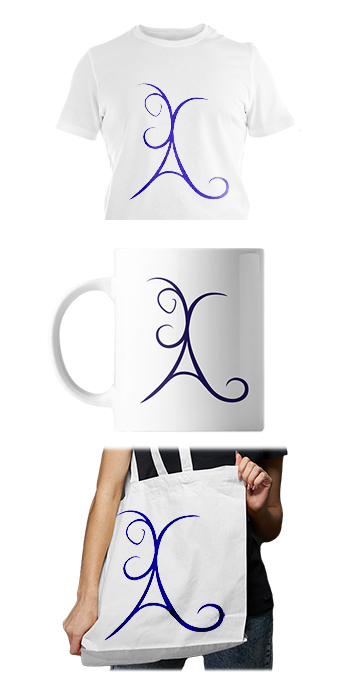
Some merch possibilities with my music logo on them
Many of these services can be outsourced to the internet for a fraction of the cost the majors charge. For instance, you can distribute your music to iTunes (Appel Music), YouTube etc., for a few dollars per year. There are plenty of t-shirt manufacturers to whom you can upload designs, and they'll ship you the merch, or even fulfill orders for you.
Digital Marketing for the independent musician is also more available and grows more sophisticated every day. It's unprecedented, really. You can target listeners of music in your genre more tightly than ever before. And algorithms are getting more and more clever about figuring out who your fans are, very quickly. It's a massive opportunity.
Build A Career As An Independent Musician
The old paradigm was that 200,000 album sales from a debut album was not good. It was a major operation, involving dozens of people putting together promo campaigns, distribution, manufacturing and publicity.
Recording studio budgets were sometime hundreds of thousands of dollars. Recording artists were sometimes so far in debt after their first record, that they would need to put out another record or two, to break even.
And for the privilege of going into debt, the artists would also typically give up a high percentage of their royalties to the labels, too.
Now, you can record at home with $1,000 worth of studio gear, shoot videos on your phone for promotion, and buy some Facebook ads to promote your release. If you sell 2,000 (not 200,000), you keep all the money beyond expenses.
Think about it -- 2,000 @ $15/unit sold is $30,000. And we're not yet talking about streaming royalties and merch sales. Is it a lot? No, but it's a start. But you and I both know that most of us reading this, can't get our friends and family to like our music posts, let alone buy something from us.
Well, if you want to build a career as an independent musician, this is your new job. You develop methods for attracting fans, getting their contact info, following up with them to bring them deeper into your world, and occasionally selling them music and cool related stuff.
Going With A Major Label, Or An Indie Label, Versus Staying Independent
Let me lay it out plainly for you. You're probably not going to get a major label deal anyway. You have a much better chance of appealing to 10,000 people who love your kind of music, than appealing to 500,000 people that a label pushes you to.
But let's just say you've got what it takes for mass appeal. What will the majors ask you right out of the gate?
You see, in spite of the way I sometimes make fun of major labels, they have a risky job. Most of the time what they do loses money. They're going to look for ways to mitigate that risk.
So, your job, whether you want a record deal or not, is to build your fanbase. At the point when you have a good fanbase, maybe the majors will come calling (and a lot of scammers will come calling too).
And at that point you should ask . . .
What Can A Record Company Do For Me?
I don't mean that figuratively. I mean it literally. What, specifically can a record company (major, or indie label), do for you, in exchange for what it's going to cost you?
And you would ask the same questions of an Indie record label. An indie label could potentially give you a lot more attention, but might not have the same influence in the music business.
Building An Independent Music Team
Building A Team
Here's the thing. Eventually, you'll need a team. You can't do all this on your own.
Graphic designer? Producer? Social Media Manager? It's up to you which roles you'd like to offload.
Your fans can be a great source of help in these cases. And I'd look at a record company contract offer as an offer for them to be on your team.
I'm thinking about a particular blues guitarist whom you might not think of as an indie musician, but he is. He plays fairly big shows, and plays all the time. He's got an email list he uses to promote records, DVDs of concert footage, and t-shirts and other merch.
He's got a family that he works with to do his promotion. It's a partnership. They have grown together. He has other people that handle other aspects of his business, as well. In order to get to this level, you will also need a team.
The question you should be asking, if you get into a situation in which you're talking to either a major, or an indie label is, "Will they be good team members for me?"
OK, two questions, as the devil is often in the details. Also, "What specific roles will they play for me?" In other words, will they do graphic design and put together radio ads? Tour support? What exactly are they going to do for the cut they take?
Making Money From Music
If you’re an aspiring indie musician, songwriter, duo, or band, there are many ways to make money from your music. While many people focus on streaming, touring or selling recordings, there's also merch, endorsements, VIP experiences, special events, TV & movie soundtracks, session work, grants, and a lot more.
In fact, a band I was once in had a song featured in a local play that was looking for original music!
You'll have to decide what works for you. A lot of the advice I see on this subject sucks. They might tell you to teach guitar, as you'll be doing music, and making money.
Well, teaching guitar is time consuming, and probably isn't going to generate many new fans. Focusing on getting music in front of music supervisors might get you on a TV show, or a commercial that gets your songs in front of thousands, or hundreds of thousands of people.
I'd focus more on money-making that's central to where you want to go as a musician, then the secondary stuff that's liable to get you in front of people, then thirdly on stuff that's music-related, but not helpful career-wise.
As an example, let's say you do a recording, and it turns out well. Other artists might want you to produce, or rap on their record. There are opportunities for good things to happen there.
Music Royalties: What To Do To Get Paid
You don't really want to know about music royalties, do you? Maybe you just want to know what to do in order to get what's owed you, and make sure you don't get ripped off.
So, let's get right to that, and I'll explain more about royalties, in-depth below, in case you're having trouble sleeping.
Music Royalties Explained
When you create, record, or publish music, you may be entitled to royalties from sales, live performances, airplay, streaming and more. This can be a complex topic, so let's break it down.
Each recorded song has two main types of copyrights associated with it: the composition (songwriting) and the recording itself.
If you're a songwriter, and someone else records your song, you get paid for the songwriting part!
Dolly Loves Whitney
I once saw an interview with Dolly Parton, and the interviewer, who seemingly didn't know how music royalties work, asked Dolly if she was upset that Whitney Houston had a bigger hit with "I Will Always Love You", than Dolly did. Dolly wrote that song, if you don't know.
Well, Dolly made an estimated $10 million from Whitney's version. So no, she wasn't upset.
She got paid as the songwriter.
Believe it or not, years prior, Elvis had also wanted to record the song. But his people wanted Dolly to give up 50% of the songwriting royalties in exchange for recording it. Dolly turned them down. Being smart, she refused to give up her publishing rights.
Whitney didn't write any of the songs she recorded. So, unless she negotiated a cut of the publishing in exchange for recording a song, she would have missed out on that slice of the pie.
But she would get some of the master recording rights royalties on each song she performed on.
Elvis, did have some songwriting credits, mostly as a co-writer, including "Hound Dog" and "Love Me Tender". Some of these songs have been recorded by hundreds of different artists, and Elivis' estate gets paid every time.
Major record labels have historically taken a large chunk of songwriting royalties and master recording royalties, in exchange for signing an artist, and fronting the money for recording sessions, marketing and manufacturing of CDs/Vinyl. Starting to get the idea?
In short, the songwriters (or whomever owns the publishing) gets paid the publishing royalties. Musicians may get paid for their contributions to the recording.
Songwriters have 4 potential royalty streams:
Mechanical Royalty – If you write a song, you're supposed to get paid a 'mechanical royalty' from every album/vinyl/CD/download sale. It's currently set at about $.09/sale, and is to be paid, even if the download is a free download.
Performance Royalty – As a songwriter, you get a 'performance royalty' when your song is performed -- even by you -- at your local pub, or in an arena by Julio Eglesias. You also are owed this royalty for the song being performed (a recording played) on terrestrial broadcast radio, or on an online streaming service, such as Spotify.
Since these are called 'performance royalties (a spin of a CD on the radio is considered a performance), these royalties are collected by what's called a "Performance RIghts Organization", or PRO. BMI is mine, ASCAP and SESAC are also in the US. The rest of the world also has PROs and the influence extends through much of the world, so you should still get your royalties from that radio station in Japan.
Note: Venues that have live music are supposed to be paying royalties to PROs. You can submit your setlist to your PRO to get paid for your own performances at the venue. It's a good idea to check with the venue first, though. If they're not paying, or unaware they're supposed to, you might make an enemy if ASCAP shows up at their door, demanding money.
Streaming services negotiate their performance royalty rate with PROs. They're not very transparent about how they arrive at those rates.
Synch Fees – Synch fees are paid when your music is used in a TV show, movie, or on YouTube. Your music is 'synchronized' with video, in other words. This rate is not set by the goverment. It's supposed to be negotiated in each case.
In practicality, YouTube isn't going to sit down with you and negotiate how much they will pay you to use your song. What they do instead is say, "Hey everybody. Make your songs available for YouTube monetization and we'll split the advertising money we make, with you. Take it, or leave it."
That's some negotiation!
Sheet Music Sales -- Yes, you can collect royalties from sheet music sales. I'm not going to go into it here, as it's not a use-case for most indie acts.
Master Recording Royalties
So far, we've just talked about songwriting, or publishing royalties. A song exists independently from the recording of said song. The recording itself can also be copyrighted, and royalties collected from its use.
These royalties are called "Master Recording Royalties". They are owned by the people who make, or pay for the recordings. That could be you, a recording studio, session musicians, a record company, or a producer. These royalties are collected by distributors and typically paid to the record company (which might also be you), to pay out to whomever owns them.
As an DIY, indie musician, I suggest you own 100% of these, unless you have a really good reason to give them up.
Taylor's Master Recording Rights Fiasco
Taylor Swift has famously found a very time-intensive workaround for the awkward situation in which someone else (someone she doesn't like) owns the master recording rights to her old catalog.
Since the master recording rights to her older stuff have been sold, if someone uses the recordings in a movie, for instance, Taylor would earn the songwriting portion of the royalties for the songs she wrote, but someone else would earn the master recording royalties.
So what does she do?
Well, she has decided to re-record all her old stuff. Any synch licensing opportunities that come up, get guided to the new recordings, to which she owns the rights! Smart move.
Work For Hire
Work-for-hire just means someone is paid a fee for playing on your recording, usually in exchange for giving up any potential future master sound recording royalties.
If a musician plays on your recording, then they deserve some of the royalties from that specific recording, right? But, unless their part is significant enough to be considered integral to the composition of the song, they wouldn't earn songwriting royalties.
They would earn a portion of the master recording royalties.
Well, this gets pretty complicated to track (pun intended), if you have a bunch of different people, playing on different cuts. And you might be responsible for distributing these master recording royalties.
It's generally better just to have people do things for you as a favor (in writing, if possible), or pay them on a work-for-hire basis. Make sure it's a valid, legal contract that basically says, "You're playing on this for the consideration of $x, and give up all rights to any payments beyond that."
I'm not a lawyer, and that's not legal advice :-)
Creative Commons, Copyright & The Independent Musician
Creative Commons offers a way for independent musicians to share their work without having to give up all of their rights. For instance, it can encourage collaboration if someone knows they can remix a song, without fear of legal trouble.
Creative Commons offers a variety of licenses that allow different types of users to share your music in different ways. The Attribution license lets others use your music as long as they attribute the work to you, while the Noncommercial Sharealike license allows others to remix, transform, and build upon your work but does not allow them to sell it.
Creative Commons is a valid way forward for promotion and sharing your music. As an example, you can offer stems for re-mixes under one of their licenses. In this way, your music can gain a ton of exposure because multiple producers and mixing engineers might do re-mixes and alternate versions of your song, and expose their fans to your work.
Music Distribution For Indies
Distribution used to be a big part of the job of record companies. How could you, as an individual, or band, get your new album into record stores across the country? Most people wouldn't know where to start. But a record company has the contacts, a distribution arm, or already works with a distributor.
Now, of course, most sales are online. And there are lots of services who will distribute your music to Apple Music, Spotify, YouTube and other online stores and streaming sites. Most charge a small fee, or a percentage. They also are responsible for collecting some of your royalties, and distributing them to you.
Things to look out for with these services.
Some Of The Big Distribution Players
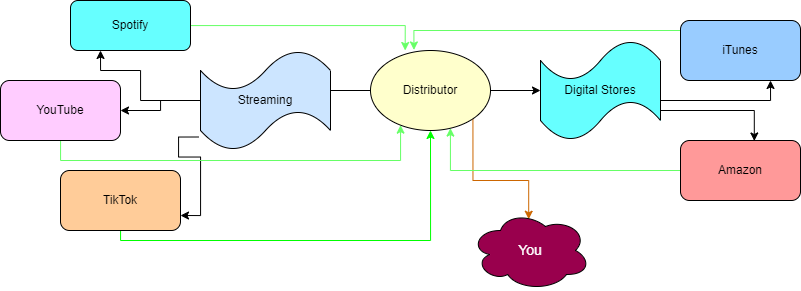
Your distributor sends your music to streaming sites and digital music stores. They send earrings back to your distributor, who pays you.
DistroKid: $19.99 to upload unlimited albums & songs for a year, for the basic level.
Ditto Music: $19 dollars per year, for the basic level.
CDBaby: $29 per album and $9.95 per single.
Amuse: Free at the basic level. At $5/month, Amuse Pro gets you YouTube Content ID, royalty splits and multiple artist profiles Amuse seeks to develop a relationship with some of the artists, and then take a more active role in promoting them (and a split of royalties). But for the regular Joe, it's free.
OneRPM: No upfront fees, but a 15% cut of your royalties.
Symphonic: The basic level is $19.99 per year.
The Independent Music Artist's Business Plan
You might have heard you should develop a business plan as an indie musician. I'm going to suggest something different. But before I do that. let's talk about how business plans help.
What's bad about them is that they're a PIA, and they take a long time. I'd suggest at least making some goals and projections, instead.
Let's start with a big goal. Let's say you think about the minimum lifestyle you want. Maybe your first tier goal is to replace your job and support yourself with your music. Think about how much money it would take.
Let's say $60,000.
Now, let's look at your main potential sources of revenue. Let's say it's CD sales (yes, people still sell lots of CDs), shirts, and house concert ticket sales.
- CD Sales
- Shirt Sales
- House Concerts Ticket Sales
For the sake of simplicity, let's say that each sale nets you $20, and you'll need $100,000 to pay for expenses, and still have $60k left over for you.
This means, you're going to need to sell 5,000 items over the course of a year.
Let's say you've put together a great system for booking those house concerts, and you net about 15 ticket sales from each one. You sell CDs and other merch at each show. Let's say, between tickets, CDs and tee-shirts, you hit an average of 40 sales. If you do 50 shows in a year, that's 40% of your $100k.
Here's a little spreadsheet I made in Google Sheets to calculate potential revenue. It's as simple as pie. You can copy it here, and adapt it for your own purposes.
Hmmmm . . .
I guess you'd better collect everybody's email address from the house concerts, so you can follow up with them. And come to think of it, you'd better give your TikTok followers an incentive to get on your email list, as well.
In fact, you discovered last year, that each person on your email list was worth $4 in sales for the year. Since you need $60,000 more in sales, you'd better get 15,000 more on your email list.
So, you start looking into Facebook ads, and figure out how to get good quality subscribers for $3 each. It's not a very high profit margin, but you can do a bunch of that to build your business (it takes a while to build most businesses, folks).
If you spend $3 to make back $4, you won't get to your $60k this year, but you likely will next year, when you have a big email list that you've already paid to acquire.
Now, I'm just pulling these numbers out of a hat, but I'm sure you can see how it changes your thinking, pulls you out of fantasy-land, and orients you toward what actually needs to happen in order for you to get what you want from life and your music career.
Why Am I Talking About Money So Much -- Am I Just A Money-Grubbing Asshole?
No, I'm not just a money-grubbing asshole. You'd be surprised at how I live, and the sacrifices I've made so that I can do what I want to do, almost every day. That is, writing songs, arranging, recording. and producing them.
That being said, this site is about being an independent musician. A lot of folks want to support themselves with music and write their own ticket. In order to do that, the odds are overwhelming that you'll have to treat aspects of your music like a business.
I'm not talking about being immoral, or selling out. I'm talking about understanding how to support yourself and your art.
And if you decide you just want to record good music, and sell or give away a few dozen copies to your friends and family, that's valid. I made that decision at one time, as well. I wish I hadn't, but I understand where you're coming from.
There's nothing wrong with that. And you'll find a lot here to help you. Just ignore the numbers and my business-oriented ramblings.
As for the rest of you, welcome aboard also. We're on this journey together.
Top Independent Musicians
You might be surprised at the artists who are independent. Macklemore & Lewis broke it wide open with Thrift Shop. Thrift Shop was the second single from an independent artist to hit #1 on billboard, and the first in almost 20 years (Lisa Loeb was the first, in 1994).
Frickin' Adele is apparently independent, as is Chance The Rapper.
Who is the biggest independent musician of all time?
Arguably, Prince.
Prince was on a major (Warner) for many years. But after he became famous, what need did he have of them? So, he worked hard to fulfill his remaining contractual obligations, and then went independent. However, Warner still had the master recording rights. Prince wanted them back and eventually, he got the rights to his masters back from Warner.
In the negotiations, Prince allowed some of his Warner back catalog to be remastered and re-released under their label, and he got his master recording rights back. I think both parties were probably smart to make a deal, rather than to have a protracted legal battle.
Independent Music Awards
As an independent musician, you might be eligible for mainstream awards, such as Grammys. You also could qualify for any of the Independent music awards, such as the Independent Music Awards (global), or the AIM Independent Music Awards (UK).
Criteria for what independent means varies by organization. For instance, AIM is looking for . . .
An independent musician who is not signed with, or owned by Warner Music, Sony Music or Universal Music or their subsidiaries. You're considered an independent unless you're 49% or more owned by one of those (although you can get away with having distribution deals with a major). Also you can't control more than 5% of the total UK recorded music market.
I don't think you're going to have a problem with that last part.
Independent Musician Resources List
Instead of the typical indie resource list, I'm going to talk about the people I follow, or buy from, and why.
Independent Musicians
Here are musicians who are not only creative and talented, but excellent examples of how to build a brand, and draw listeners into their world and turn them into fans.
Kawehi: Kawehi is a multi-instrumentalist, singer, songwriter, arranger and looper. With several YouTube videos over a million views, world tours, and even a superbowl TV commercial appearance, she is an example of how to take talent + personality and turn it into an indie music career.
Mary Spender: As I write this, Mary Spender has 631k YouTube subscribers. As well as writing deeply-felt songs, and singing them well, she has a gift for opening up to the camera, being vulnerable, and real. She uses YouTube to draw folks into her world and many of them become big fans and supporters.
Marketing
Indepreneur: In the music space, Indepreneur is top-of-class. They have an excellent understanding of marketing, and how to apply it to music. They know, and teach you how to turn casual listeners into fans and ultimately, customers. However, it's a lot. And some of the processes are very technical.
Cover Song Licensing
If you want to release a cover song, you'll need to get a license, and pay for each sale or download. It's easy though. Your distributor might even include the service for a fee. But if not, check out . . .
Easy Song Licensing: I had a buddy who wanted to license a Hendrix song and the Hendrix family wouldn't respond to him. Well, you are free to record practically any song you want to record, without the songwriter's permission (or whomever owns the publishing rights). However, you need to pay a bit (about $.09/sale, and a small admin fee). Easy Song Licensing makes this process quick and easy.
I recommended it to my buddy and it went off without a hitch.
Recording, Mixing & Mastering
Reaper: My DAW of choice. $60! It does everything Ableton and Protools does.
The Reaper Blog: Jon Tidey does a great job with tutorials on how to use Reaper (the DAW I recommend, if you don't already have a DAW).
Dan Worrall: Dan's YouTube channel about audio, recording, mixing, plug-ins etc., is sometimes esoteric and technical, but I always learn something, and his voice and narration style are captivating.
Produce Like A Pro: Warren Huart's look into the world of studio recording, sometimes for big time artists, but often for indies, is eye opening. Lots of production tips and tricks here.
Guitar
Tim Pierce Guitar: Tim's stories about sessions or live gigs with Joe Cocker, Chris Lord-Alge, Crowded House, Rick Springfield and more are a fascinating peak behind the scenes of the music industry. But it's his tastiness as a guitar player, and his obvious love for the instrument that make his YouTube channel a joy to watch, and a lesson on how to use social media.
Practice Guitar Now: Mike Philippov is a shredder. I'm not, and I'm not that interested in it. But frankly, the guy knows more about how to approach practice than just about anybody. I haven't bought a course from him, but his newsletter alone is filled with gems and mindsets that will help you approach your practice time more efficiently.
Vocals
Bohemian Vocal Studio: I've taken lessons from, and bought a course from Kegan DeBoheme. What he taught me helped me take a lot of the excess tension out of my voice, smooth out my range so I don't flip when I go from chest voice to head voice, and extend my range upward.
Distribution
DistroKid: I've used DK. No problems for me.
Misc. Cloud, Phone & Computer Applications For Music
Google Drive: I use Google drive to back up my important music-related audio, video, and graphics files. I have the 2TB plan. If you have a Gmail address, you already have google drive, with some storage built in. Go to drive.google.com.
Snip & Sketch: I take a lot of screenshots when creating graphics for my music stuff. If you're on Windows, you might already have Snip & Sketch. Press The Windows logo key + 'Shift' + 's' to find out.
Recorder: It's on my native Android operating system, it might be on yours. Open the app and click the big red button and your phone starts recording audio, and automatically backs it up to the cloud. Perfet for capturing song ideas the moment you have them.
Wisemapping: I use the free, open-source mind mapping tool, WiseMapping to plan out big projects.
No Label No Producer, No Limits: I'd be remiss if I didn't mention my own site, which has indie musician resources in business, recording, and mental strategies for you.
Conclusion
If you're a musician who's not signed to one of the major labels, you're an independent musician. As such, you probably have a lot of jobs: marketing, maintaining social media, writing songs, rehearsing, planning tours, booking tours, merch designs, and keeping your drummer from hitting on the wait-staff.
You probably use multiple online services to help you do the work that 15 people at major labels would have done in the past.
Hopefully, now you understand a bit more about royalties, distribution, budget projections, and how an indie career might look.
My goal with No Label No Producer No Limits (NLNPNL) is to provide you with as many tools and as much knowledge as I can to help you on your journey.
Until next time,
Keith
Home Recording & Production
Discover how to arrange your songs, record on a budget, get good sounds in the studio, get gear recommendations, and more.
Music Business For Indies
Business best practices, and how to market your music effectively with music marketing tips, tricks, and tutorials, and more.
Musicianship & Inner Game
Get better at singing and playing your instrument. Also, productivity, goal setting, and inner game (mental strategies for musicians).
About Keith Livingston

Keith Livingston is a musician, producer, recording engineer, songwriter, and internet marketer. He spends much of his time writing, arranging and producing music, and thinking about the best way to get it out there!


